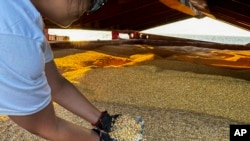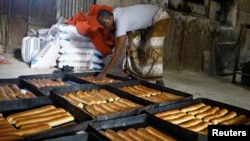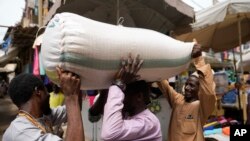The Russian government’s decision to suspend participation in an agreement that allowed Ukrainian grain to be shipped through the Black Sea will significantly harm efforts to provide food to millions of people around the world facing food insecurity, activist groups warned on Monday.
By withdrawing its security guarantees for ships carrying grain from Ukrainian ports to Turkey and on into the Mediterranean, Russia has largely cut one of the world’s biggest producers of cereal grains off from global markets.
According to United Nations data, since the initiation of the agreement known as the Black Sea Initiative in 2022, 32 million metric tons of Ukrainian food crops have been brought to market under its protection.
Russia’s decision to step away from the agreement, which takes effect on July 18, comes at a time when the need for robust global food supply is dire.
In a report issued last week, the United Nations’ World Food Program said that there are currently 783 million people around the world who do not have enough to eat, with more than 345 million of them facing “high levels” of food insecurity, and 40 million living in or near famine conditions.
Russia’s justification
In a statement announcing Russia’s decision to terminate the deal, the country’s Ministry of Foreign Affairs accused Western nations of failing to live up to elements of the arrangement that were meant to benefit Russia, while continuing to apply sanctions that harm Russian interests.
In particular, the statement objected to continued sanctions on certain Russian food and fertilizer exports.
“If Western capitals really value the ‘Black Sea initiative,’ then let them seriously think about fulfilling their obligations and actually withdrawing Russian fertilizers and food from the sanctions,” the statement said. “Only upon receipt of concrete results, and not promises and assurances, will Russia be ready to consider restoring the ‘deal.’”
'Massive' impact
On global markets Monday, prices for immediate delivery of wheat, corn, and soybean oil all rose after news of Russia’s decision broke. However, futures prices for the same commodities, which are based on market expectations of what commodity prices will be at some point in the future, spiked early in the day before falling below previous levels. The Black Sea Initiative had helped to blunt the effects of inflationary pressure on foodstuffs, but even so, global food prices were up sharply from last year even before the announcement of the deal’s collapse, according to the International Rescue Commission (IRC).
Bob Kitchen, the vice president of emergencies for the IRC, told VOA that his organization is concerned that suspension of the agreement will cause further price inflation.
“This will reduce the amount of food that is available on the market, driving up prices, and it will make a massive, massive difference to people around the world,” he said.
Kitchen said that the impact will be felt acutely in East Africa, a region already suffering through drought and various military conflicts. The region sourced 80% of its imported grain from Ukraine and Russia before the war and has seen prices rise as it struggles to find alternative sources of supply.
“In the most vulnerable countries, in Somalia, Kenya, Ethiopia, we've seen price increases of up to 40%,” he said. “Normal everyday families have had to find that much money to be able to afford to keep the kids with food and alive. So, if this deal does fall apart, as it seems to have done today, we fear that the price of food will even go much higher. So we're very, very, very worried.”
The impact will also be felt in other areas where food insecurity is particularly high, including several countries in the Middle East, such as Yemen, Lebanon, and Syria.
'The razor’s edge of hunger'
Kate Phillips-Barrasso, the vice president of global policy and advocacy at the humanitarian organization Mercy Corps, told VOA that the impact of the supply disruption will not take very long to be felt by the world’s most vulnerable.
“So, we're already seeing an impact today in terms of price, and that will continue if supplies from Ukraine are cut off,” she said. “When you're really living on the razor's edge of hunger anyway, where a small price increase can be really the difference between being able to afford food things to feed your family and not, any increase in price can be a huge shock.”
Phillips-Barrasso said that cutting the flow of food from Ukraine will make the job of organizations like hers much more difficult, as the cost of providing food aid increases.
“We're likely to see more and more hungry people…and that's really difficult,” she said.
“There are only so many donor dollars out there to assist people, and actually, that's a tightening space. So having more and more people become hungry as a result of these types of manmade shocks is really bad news because it means that we will essentially have them competing for resources in an environment where they're not readily available.”
Global anger
Many global leaders spoke out forcefully against Russia’s decision, including United Nations Secretary-General António Guterres who, along with Turkish President Recep Tayyip Erdoğan, was instrumental to the agreement’s adoption last year.
“I deeply regret the decision by the Russian Federation to terminate the implementation of the Black Sea Initiative,” Guterres said Monday. “Hundreds of millions of people face hunger and consumers are confronting a global cost-of-living crisis,” he added. “They will pay the price.”
On Twitter, European Commission President Ursula von der Leyen wrote, “I strongly condemn Russia’s cynical move to terminate the Black Sea Grain Initiative, despite UN & Türkiye’s efforts.”
At the White House, National Security Council spokesperson John Kirby called Russia’s decision “irresponsible” and “dangerous,” adding, “it will exacerbate food scarcity and harm millions of vulnerable people around the world.”
VOA’s Veronica Balderas Iglesias contributed to this article.







